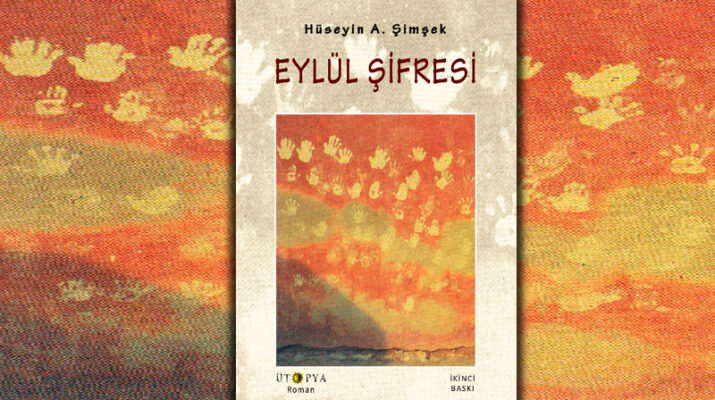Dr. AHMET ALVER*
The author of The September Code Hüseyin Şimşek was imprisoned in 1981 directly after the coup and jailed for 111 days. Following this, he was jailed again in Metris Prison where he remained until 1985. Before the coup, he had been a journalist for several leftist magazines and newspapers including Yeni Gündem, Nokta, 2000’e Doğru, Özgür Gündem, Aydınlık, Aktüel, and Tempo. Because of his connections, it is no surprise to learn that his first novel, Ayrımı Bol Bir Yol (The Road with Many Divisions) (Şimşek 1988) was the first novel published by New Voices. This novel focused on prison resistance and, in particular, a 31-month hunger strike which protested the abuse of political prisoners. Unlike Konuk, Şimşek uses a highly poeticised language to emphasise the abstract psychological nature of the tragedy and trauma of imprisonment and torture (Özdoğan 2008: 100).
The September Code (Eylül Şifresi) is Şimşek’s second novel and it follows on from The Severancebecause it focuses on the life of revolutionaries outside the prisons after the coup. Like other September 12th novels, there is a focus on depicting the ways in which the coup has changed society. Şimşek’s particular skill is the manner in which he juxtaposes the lives of his characters before the coup –through flashbacks and memories –with their lives following the intervention. As well as highlighting and emphasising the political and social implications of the coup, these flashbacks have the effect of fragmenting time and place, interrupting the plot and giving an impression of the trauma experienced by those who suffered following September 12th.
The September Codeis distinct from other September 12th novels because of its distinctive use of historical reference. The novel opens with a series of snapshots relaying the political atmosphere of the 1980s in both local and global terms:
On the other hand, the psycho political son of the Pasha says “Intervention was obligatory”. Meaning the Indian Cockcrows late and mistakenly. The lawyer from Yozgat shows evidence of the torture he suffered in the police station. The public prosecutor from Fethiye has caught husband-and-wife tourists stripped naked in the sea, continuing his fight against the “indecents”! While the tourist woman, who is a physiotherapist, is thrown into prison without any attention given to her nervous breakdown, her husband is still struggling not to lose his tongue. Amnesty is still onthe agenda.
(…) according to one source, the bestseller of the September period‟s fifth year third week is an essay: “No more Hiroshimas.” In such a period the cunning politician gives advice: Politics is the enemy of justice (Şimşek 1991: 5).
This passage indicates the power of perspective: on the one hand, the state are trying to legitimise the coup and distance the public from politics but on the other the police are arresting „indecents‟, thus subjecting the individual to political machinations. Thenarrator, therefore, asserts that politics in civil life is the enemy of justice. This becomes the major theme of the novel as Selim, a revolutionary leftist, falls in love with Meral, an apolitical and apathetic character who offers happiness to Selim but also an abandonment of his former political convictions.
The novel juxtaposes the revolution and love across two time spaces, pre-coup and post-coup. The novel thus reveals the changes in the politico-social world of Turkey brought about by the coup through minute focus on the lives of two young lovers. Meral and her parents represent the „ordinary person‟, railed against by Ağaoğlu, whose language and attitude towards Selim and other prisoners support the claims of Sibel Irzık, and Sükrü Argın: namely, that September 12thcreated a divide between prisoners and the rest of society. Through inner monologues Saniye Hanım, Meral‟s mother, reveals she is disappointed to see Hale, a friend of Meral highly influenced by politics. According to Saniye, women should stay out of politics because it makes them “sinister”. Likewise, she perceives politics as a “trouble” that children should be kept away from. It is significant that this happens as an inner monologue: it is doubly reflective of the nature of the petit bourgeois mentality shared by both Meral and her mother that their disapprovals should be made in their own heads, rather than being confrontational.
This mentality is a source of trouble for Selim. Whilst he is in love with Meral, he is disturbed by her lack of political drive. He criticises her for attending university –a right for which women fought –but now criticising female activists as “mannish” (Ibid.: 71) In contrast to the relationship with Meral, Selim also falls in love with Aygül, a highly political activist who attracts Selim through political companionship and shared passion. The contradiction in Selim’s love interests is important within the novel: on the one hand, Selim has a clear admiration for female activists and a genuine sympathy for the difficulties they face in being political; on the other, however, his constant comparison of the two women repeats and strengthens the viewpoint of the dominant patriarchy.
The importance of this contradiction is that it cannot be resolved. Unlike the previous novel, there is no happy ending because the conflicts and contradictions raised by the text, and by extension society, have not been resolved. In a postmodern scene towards the end of the novel, the narrator focuses on a woman who is reading a book on a train. She is a mother whose son is in prison and she is reading Selim and Aygül’s story. Whilst she is reading, a couple sit opposite to whom she recognizes as the characters from the book: “… The reality was not that she was reading a novel; what she thought she was reading was actually what she had lived!” (Ibid.: 171) The novel‟s denouement highlights this point in the form of a letter or a plea to the people of Istanbul:
Dear people of Istanbul! Seyit and Ayşen are in your city. In your district. In your neighbourhood or even in your street. For a long time, they’ve been engaged in multiplying themselves. And mixing with you… They were the missing link that emerged years ago and could never be filled. They have never forgotten their lives with you. They’ve always known it! If you ask, they can tell you what happened. And why they’ve never spoken before. Come closer, a couple more steps and your September ciphers will be revealed (Ibid.: 183)
This metatextual scene indicates the universality of the novel‟s message: the characters within the novel can be found everywhere. Whilst contradictions and problems remain, the most important act of resistance for a revolutionary is to help decipher the „September Code‟ which is keeping people silent.
* Full text:
https://turkishstudies.net/DergiTamDetay.aspx?ID=4694

